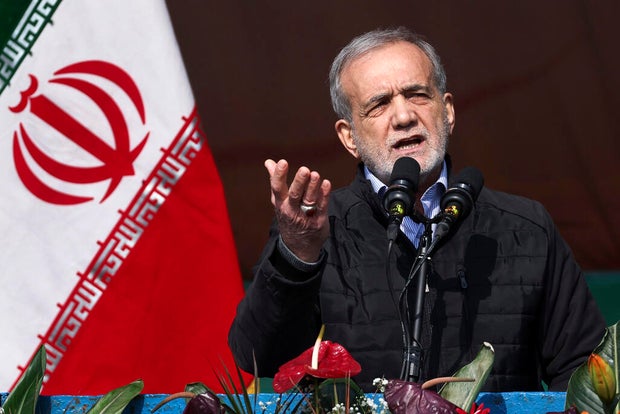Iran President Masoud Pezeshkian said Sunday that the Islamic Republic rejected direct negotiations with the United States in response to a letter President Trump sent earlier this month over the country’s rapidly advancing nuclear program. It was Tehran’s first official response to Mr. Trump’s letter.
“Although the possibility of direct negotiations between the two sides has been rejected in this response, it has been emphasized that the path for indirect negotiations remains open,” Pezeshkian said, adding Iran’s response was delivered via the sultanate of Oman.
Iranian Presidency Office via AP
It’s unclear, however, whether Mr. Trump would accept indirect negotiations. Indirect negotiations have been unsuccessful for years since Mr. Trump initially withdrew the U.S. from Tehran’s nuclear deal with world powers in 2018.
The White House offered no immediate reaction to the announcement.
Mr. Trump revealed in an interview with Fox Business News earlier this month that he had sent a letter to Iran’s Supreme Leader Ayatollah Ali Khamenei urging him to negotiate and warning of potential military action if it refused.
“I would rather negotiate a deal. I’m not sure that everybody agrees with me, but we can make a deal that would be just as good as if you won militarily,” Mr. Trump said. “But the time is happening now. The time is coming up. Something’s going to happen one way or the other. I hope that Iran — and I’ve written him a letter, saying, ‘I hope you’re going to negotiate.’ Because if we have to go in militarily, it’s going to be a terrible thing — for them.”
On Sunday, in an interview with NBC News taped before Pezeshkian’s comments, Mr. Trump reiterated that he is considering military action and secondary tariffs if Iran does not agree to a nuclear deal.
“If they don’t make a deal, there will be bombing and it will be bombing the likes of which they have never seen before,” he said.
Mr. Trump’s overture comes as both Israel and the U.S. have warned they will never let Iran acquire a nuclear weapon, leading to fears of a military confrontation as Tehran enriches uranium at near weapons-grade levels – something only done by atomic-armed nations.
Iran has long maintained its program is for peaceful purposes, even as its officials increasingly threaten to pursue the bomb as tensions are high with the U.S. over its sanctions and after the collapse of a ceasefire in Israel’s war against Hamas in the Gaza Strip.
As the U.S. conducts intense airstrikes targeting the Iranian-backed Houthi rebels of Yemen, the risk of military action targeting Iran’s nuclear program remains on the table.
A report last month by the United Nations nuclear watchdog, the International Atomic Energy Agency, said Iran had “significantly increased production and accumulation of high enriched uranium.”
Last week, Khamenei warned that U.S. threats against his country “will get them nowhere,” adding that Americans “and others should know that if they do anything malign to the Iranian nation, they will get a hard slap.”
He had previously dismissed Mr. Trump’s overtures for talks, accusing the U.S. president of attempting to deceive global public opinion by portraying the United States as willing to negotiate and Iran as unwilling to engage.
Mr. Trump’s first term in office was marked by a particularly troubled period in relations with Tehran. In 2018, he unilaterally withdrew the United States from Iran’s nuclear deal with world powers, leading to sanctions hobbling Iran’s economy. Iran retaliated with attacks at sea — including one that it likely carried out and that temporarily halved Saudi Arabia’s oil production.
Trump also ordered the attack that killed Iran’s top general in a Baghdad drone strike in January 2020.

